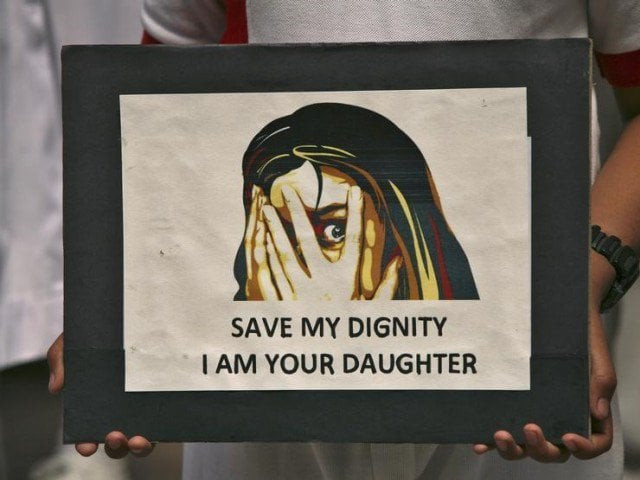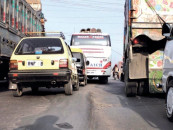From stigmatisation to inaction: Protection of Women Act 2006 brings no relief to rape victims
Police blame victims; claim cases reported too long a period after the crime

For decades, human rights activists attacked the Hudood Ordinance 1979 for its treatment of rape victims. This ordinance was introduced by Council of Islamic Ideology but in fact, was widely criticised by Islamic scholars as well.
In 2006, an amendment (Protection of Women Act) put zina or rape clause under the Pakistan Penal Code. This meant a rape victim who had to go to court along with four eyewitnesses previously could now go to a police station and register an FIR instead. The amendment also reduced the number of eyewitnesses to two people.
PTI worker, two others booked for raping woman in Faisalabad
However none of the changes actually helped rape victims as people had expected – not in Khyber-Pakhtunkhwa at least.
Relief denied
Victims and families complained the police, in most cases, do not register an FIR. Even if after delays FIRs are registered, faulty investigation results in the accused being released by courts.

In K-P in particular, the police do not cooperate with rape victims and avoid registering FIRs.
In August 2015, a polio worker was raped in her house in Nowshera and even after four months of persistent pleas, the Akbarpura police station did not register her case.
In fact, the Nowshera DPO claimed the victim was trying to be another Mukhtaran Mai – a woman who was first gang-raped and then paraded naked in front of the neighbourhood.
Local journalists went one step ahead and accused the rape victim of concocting the story in a bid to seek asylum in the United States.
Five-year-old girl raped, left semi-conscious in Peshawar
While it may be possible there was no rape, the police, however, are in no position to come to that conclusion. Without a thorough forensic and medical investigation, the police cannot make such claims.
The victim said after being raped, she went to the police who indulged in delaying tactics. This forced her to hold a press conference in Peshawar on December 22.
Victim blaming
Victim blaming is not new – not in Pakistan, not in other countries in the world. “She is lying to get attention” or “She was asking for it, walking alone at night” or “She said no, but she meant yes” are statements people make to justify the horrifying act of rape.

Talking to The Express Tribune, human rights activist Uzma Mehboob said police officials often blame victims. According to Mehboob, police officials conveniently claim the crime was reported several days after the rape – when no data or evidence can be collected.
She said several seminars on the subject have been organised where forensic experts have said the passage of days does not necessarily destroy the evidence.
Even in the case of the polio worker from Nowshera, police claimed the victim had burnt her clothes.
Mehboob also said the treatment of rape was inappropriate by not just the police but the entire society.
Middle-aged woman gang-raped at panchayat
“Rape victims are often advised to not publicise their plight as it would stigmatise them and bring ill-repute to the family,” she said. “Even the police place the onus of responsibility on the victim and ask incorrect questions like, ‘Why were you outside in the first place?’” Mehboob added.
Potential for resolution
Talking to The Express Tribune, DSP Shahzadi, who worked as the SHO of the women police station in Hazara for 12 years, said rape cases could be handled better if policewomen deal with them.
“The number of policewomen in K-P is very limited but it will really help victims if policewomen register these cases,” she said. “In every police station, policewomen should deal with violence against women.”
Shahzadi added in Hazara, rape was the most common crime faced by women while in Peshawar, murder and violence were more common.
Woman rights activist Rukhsanda Naz also advocated for women police to deal with cases concerning violence against women as they are in a better position to understand their problems. “In this regard, desks with policewomen can be established in all police stations,” she added.
Case registered: Five-year-old raped, abandoned in plot
A five-year-old girl was raped and left in a semi-conscious state, bleeding, in a deserted plot in Wazir Bagh near Yakatoot police station Saturday evening. She was rushed into emergency surgery which she survived, however, few details have been released yet.
Heinous crime: Man held for child rape attempt
A 35-year-old man, a resident of Bajaur Agency, has been arrested on suspicion.
Talking to The Express Tribune, police said the five-year-old girl went out of her house Saturday afternoon and did not return for several hours.
She was kidnapped, raped and found by her family members in a deserted plot later, not completely aware of her surroundings and badly hurt. She was rushed to Lady Reading Hospital (LRH). According to an official at the facility, she is still admitted there after undergoing an emergency operation at the gynaecology ward.
“The girl had been raped; her family members found her sitting in a deserted plot, unable to talk or even stand,” said an official of Yakatoot police station, requesting anonymity. He added, “She was bleeding and taken to LRH and we were immediately informed.”
He said since evidence suggests she was raped, an FIR under Section 376 of the Pakistan Penal Code against the culprit has been registered.
The father of the girl, a resident of Esa Khel, Mohmand Agency who has been living in the city for the past 15 years, is a daily wage earner.
Published in The Express Tribune, February 1st, 2016.













COMMENTS
Comments are moderated and generally will be posted if they are on-topic and not abusive.
For more information, please see our Comments FAQ